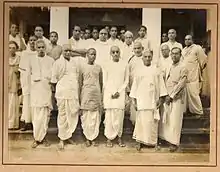Veshti
A veshti[1] (Tamil: வேட்டி), also known as vēṭṭi, is a white unstitched cloth wrap for the lower body in Tamil Nadu and in the North and East of Sri Lanka. Vēṭṭi is a part of the traditional attire consisting of Kurta and Angvastra. The garment is a single piece of cloth and similar to the dhoti, one of the earliest draped garments of India. A vēṭṭi is often layered with horizontal stripes or borders across its length.

Style
Like many wrap clothes, the vēṭṭi varies in wearing style. It is often simply wrapped around the waist, secured by a corner being tucked beneath the wrapped cloth. It is also worn as Sarong, unlike dhoti, which is looped between the legs.[2] A belt is also used over it (less popular now) just below the closing.[3]
Men and women both wear it. For women, the drape is known as vēṭṭi -mundu.[3][4]
Political identity
Various border (Saffron, red, green, and blue) colors of vēṭṭi represent different political parties' identities in India.[2][5]
See also
References
- Dhotis, Rhythm (2020). "What is veshti and What it is made of?". Rhythm Dhotis.
- Dasgupta, Reshmi R. "Cocktail Conversations: Veshti Vs Dhoti". The Economic Times. Retrieved 2021-01-24.
- Saris: An Illustrated Guide to the Indian Art of Draping. Shakti Press International. 1997. pp. 30, 32. ISBN 978-0-9661496-1-6.
- Anawalt, Patricia Rieff (2007). The Worldwide History of Dress. Thames & Hudson. p. 232. ISBN 978-0-500-51363-7.
- Kannangara, Nisar (2019-06-01). "The politics of clothing in postcolonial Indian democracy". Clothing Cultures. 6 (2): 237–247. doi:10.1386/cc_00014_1. S2CID 219279532.
External links
![]() Media related to Veshti at Wikimedia Commons
Media related to Veshti at Wikimedia Commons